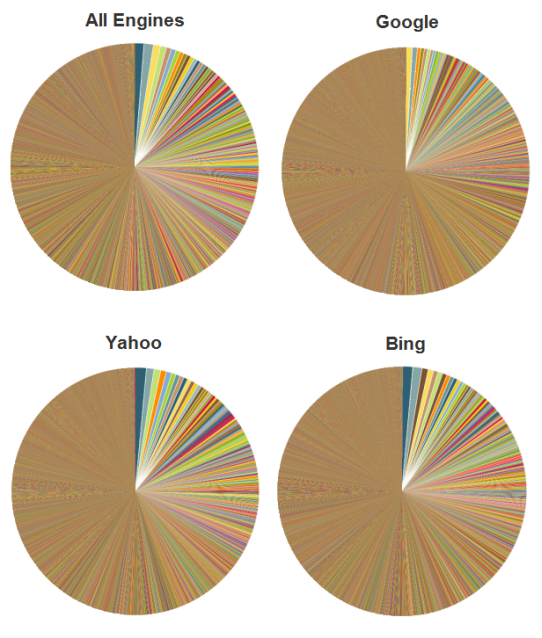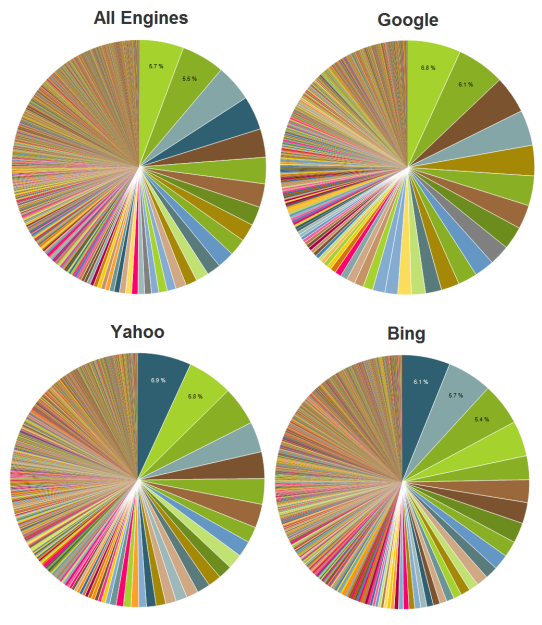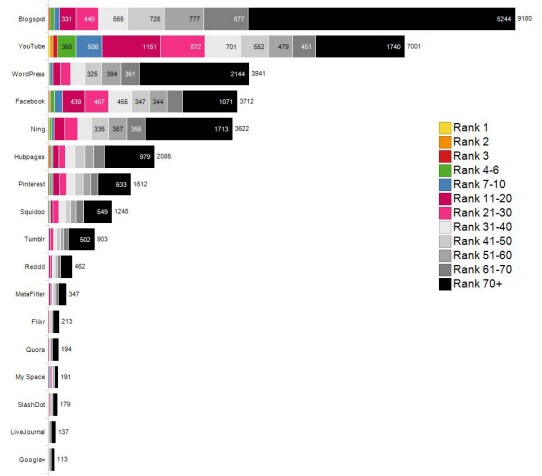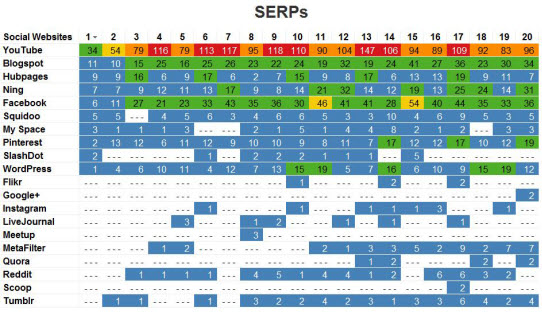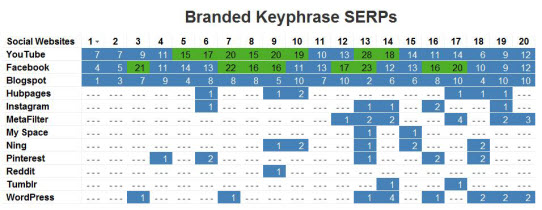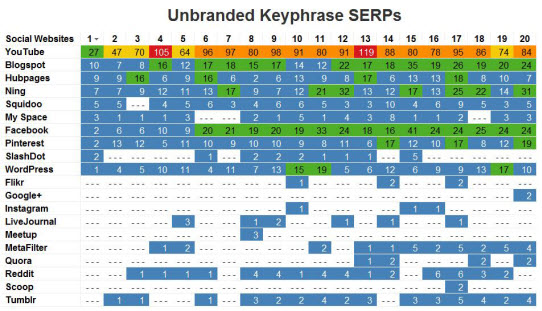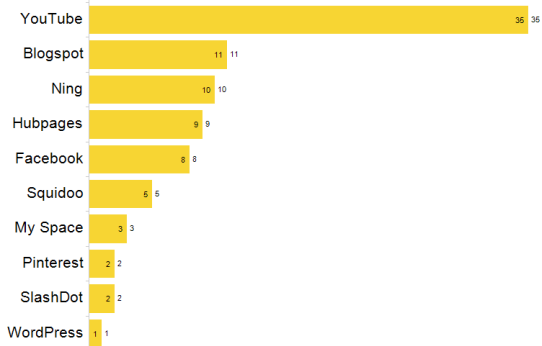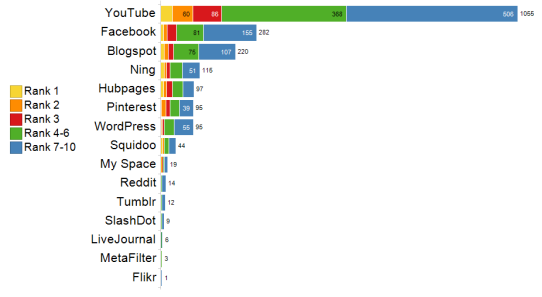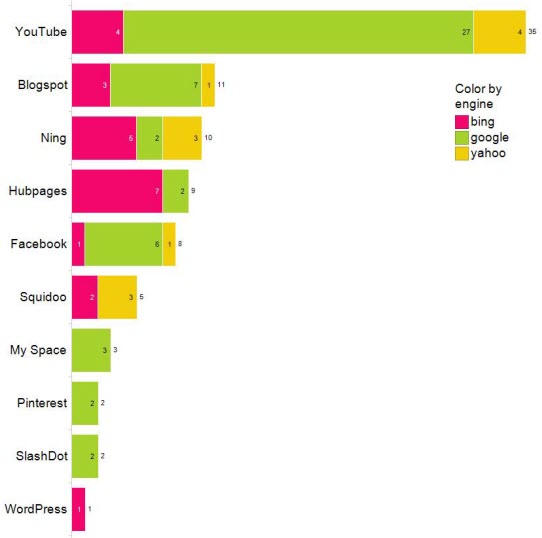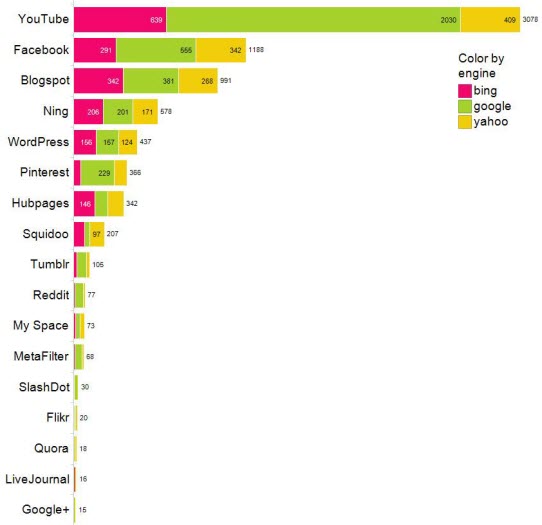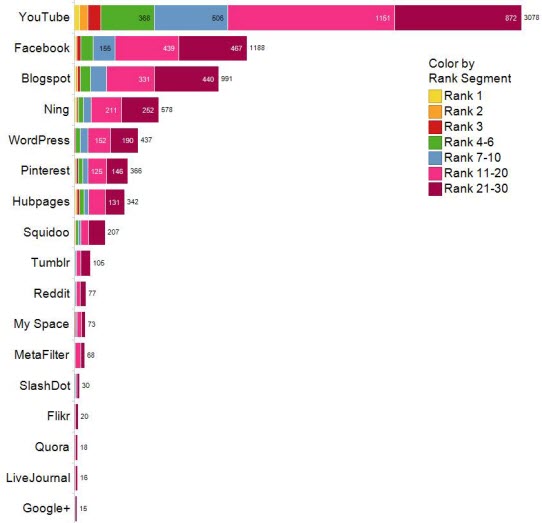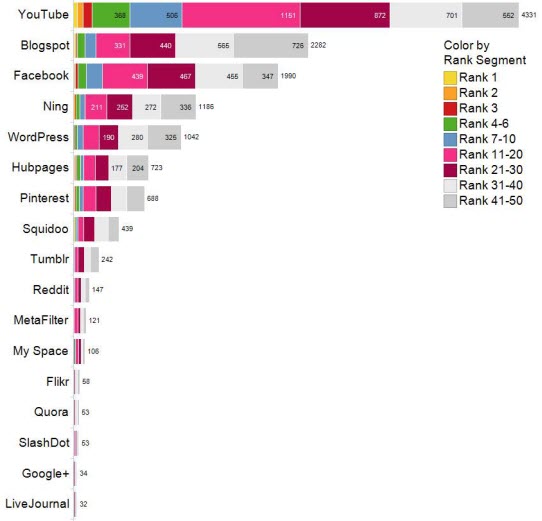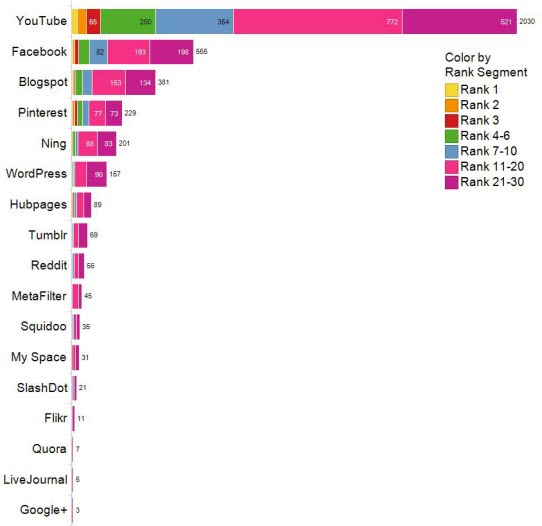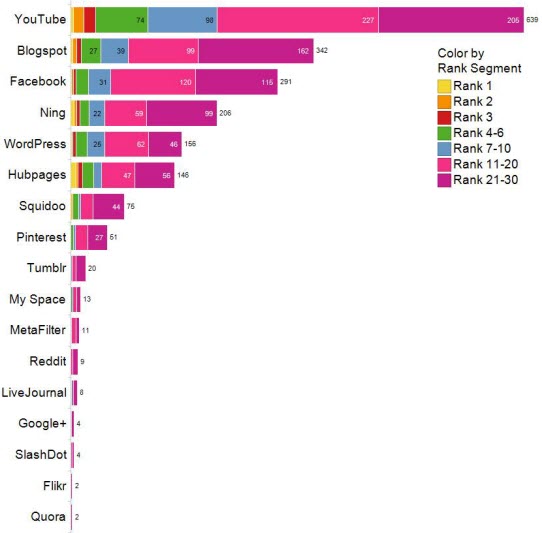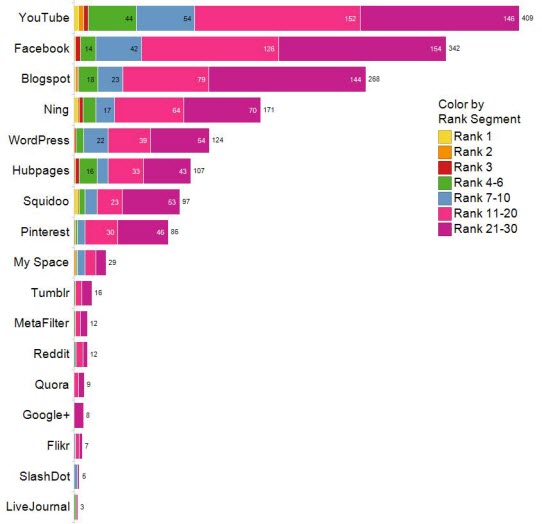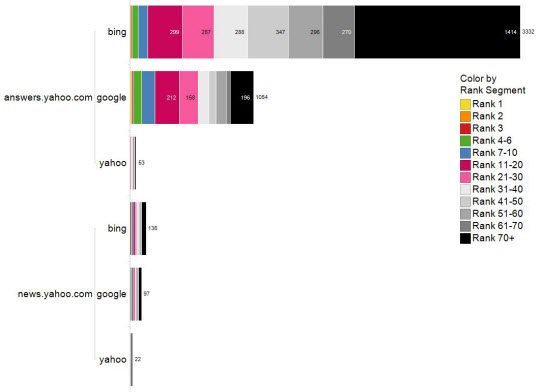The Value of Social Media in Organic Search
March 20, 2014As the number of digital marketing channels continues to expand at an exponential rate, big brands are often left with tough decisions about where the best places are to spread their messaging and spend their budget. Due to the massive user bases, it’s difficult to look past the marketing potential of the established and rapidly growing social media properties such as Facebook, Twitter, and Pinterest. Of the top 15 global websites, 6 are social media sites and 6 are search engines or discovery portals. Here are Alexa’s rankings based on the sum of page views and visitors:
| Alexa Rank | Domain | Type |
|
1 |
Google.com | Search Engine – Service Portal |
|
2 |
Facebook.com | Social Media |
|
3 |
Youtube.com | Social Media |
|
4 |
Yahoo.com | Search Engine- Service Portal |
|
5 |
Baidu.com | Search Engine |
|
6 |
Wikipedia.org | Information Hub |
|
7 |
qq.com | Social Media – Service Portal |
|
8 |
Taobao.com | C2C Sales |
|
9 |
Live.com | Search Engine – Service Portal |
|
10 |
Twitter.com | Social Media |
|
11 |
Linkedin.com | Social Media |
|
12 |
Sina.com.cn | Social Media |
|
13 |
Amazon.com | B2C Sales |
|
14 |
Hao123.com | Search Engine – Portal |
|
15 |
Google.co.in | Search Engine |
Source: www.alexa.com/topsites
In order to catch the most fish, a brand should cast its line where the most fish are. In order to achieve the greatest reach with a marketing campaign, a portion of the budget must be allocated to social media and search. As the digital landscape evolves and relationships between Internet power houses change, it’s important to understand which combination of platforms offer the greatest overall benefits.
Considering the goal of a search engine is to find the most relevant content, I decided to investigate which social media and blogging websites are the most relevant in the godly eyes of the Google, Bing, and Yahoo algorithms.
My Research Methodology
Ranking data is an integral variable for determining algorithmic trends and ultimately crafting the most efficient search strategy. Using ranking data for a set of 7000 keywords, I examined the top 100 SERPs per keyword for Google and Yahoo and roughly 130 SERPs per keyword for Bing. More specifically, I was looking at approximately 700,000 URLs from Google, approximately 700,000 from Yahoo, and 910,000 URLs from Bing. Of the 7000 keywords, 20% were branded although separate analysis was done for each branded, unbranded and the total keyword set.
I used Alexa.com statistics to compile of a list of the most popular social networking and bookmarking sites to explore. I dropped a few based on intuition and included some additional blogging platforms such as Blogspot and WordPress. Here is the complete list:
YouTube, Google+, Twitter, Facebook , LinkedIn, Pinterest, Blogspot, Quora, Hubpages, Tumblr, Squidoo, WordPress, Reddit , Folkd, MetaFilter, Digg, News Vine, Meta Filter, SlashDot, Delicious, Fark, Scoop, MySpace, Instagram, Flikr, Meetup, Ask.fm, Tagged, VK, Badoo, LiveJournal , Fiverr , Foursquare, StumbleUpon, and Ning.
Specific domains such as Facebook, Twitter and LinkedIn have been discussed throughout the industry for years. It’s an accepted fact that search engines have limited visibility to crawl and index the content of these social media monsters, the majority of which also don’t incorporate follow links, so keep that in mind. Some domains are not search friendly by choice, nor do they need to be in the overall scheme of digital marketing.
Search Engine URL Portfolio – All Engines and Aggregate
Before I dive into the social segment, here is a visual displaying how diverse the URL set returned by search engines and even the total number of root domains:
As you can see Google offers the most diverse results, while Yahoo and Bing offer a similar more consolidated set of root domains in SERPs. Spoiler, those large segments in Yahoo and Bing are significantly different, confirming the algorithms are still not the same, contrary to some speculation in the industry. Despite making a living on studying and using Google to create efficient marketing strategies, Yahoo has now become my favorite search engine, which I will touch upon later.
When looking at more valuable locations (Ranks 1-5), the diversity of root domains diminishes dramatically and the engines clearly favor specific domains (indicative of the colors):
Social Media Domains with Organic Search Value
The main purpose of this section is to provide insights as to which social media platforms have innate value in organic search rankings. The visuals below display the social domains with enough PageRank to turn up in the major search engine results for the set of keywords:
Aggregate Rank Counts for All Engines
*For the purpose of space, specific domains were removed from the visuals due to lack of impact such as Fiver (1), Flokd (3), Badoo (3), VK (4), Fark( 4), LinkedIn (5), Digg (7), Scoop (12), Tagged (18), Delicious (29), Ask.fm (33), Foursquare (35), , Meetup (54), Instagram (59), Google+ (113), LiveJournal (137), SlashDot (179), Quora(194) ,
Aggregate Rank Counts for Rank 1
Aggregate Rank Counts for Ranks 1–10
Rank Count for Position 1 by Engine
Rank Count for Positions 1-30 by Engine
Aggregate Rank Counts for Ranks 1–30
Aggregate Rank Counts for Ranks 1–50
Google Ranks 1–30
Bing Ranks 1–30
Yahoo Ranks 1–30
Yahoo Search Hates Their Own Services but Bing Loves Them!
This graph shows where news.yahoo.com and answers.yahoo.com appear across the three engines. Oddly enough, where Google seems to intelligently use the Yahoo domains, Yahoo hardly uses them at all, and Bing overuses them!
Takeaways
Aside from the plethora of rainbow graphs, I hope you gained some valuable insights from this research, including:
- BlogSpot—Being a Google property, I expected BlogSpot to fare far worse in Bing and Yahoo search than it does. Being ranked 16th by Alexa for global top sites there is a lot of potential search equity to be leveraged from BlogSpot, especially from those dedicated blogs that have been regularly publishing content for years. And here’s something else to keep in mind: generally, blogs that rank have a fair amount of base content, however they rank for a particular post.
- YouTube –This goes without saying, but you must participate in YouTube. YouTube performs better than any “social” platform in search, and actually finished 4th overall behind Amazon.com, Wikipedia.org, and WebMd.org. Make sure you have a mix of branded and non-branded content because Google, Yahoo, and Bing all recognize the value of diverse media. And in order to own that first page, you need videos.
- Tumblr – If someone is telling your brands that Tumblr is going to have massive impacts on organic search, please ask them exactly how that is. When they say they offer followed links to will help your brands build equity on their own websites, please ask them what equity their Tumblr pages will be passing. Most of the brands incorporated in this brief study have at least one Tumblr page and only one branded Tumblr page ranked, and it was 70+ in Google. 90% of the ranking Tumblr pages are the main domain’s category pages or Tumblr.com/tag/some-word-here. It makes perfect sense to rank these pages as they reflect and aggregate value of all the Tumblr content tagged in a certain way, but your brands don’t control those pages and, because they hold so much content, any equity the page may have is going to so many places the organic impact from the links are minimal. Actual brand pages have almost no organic presence and therefore pass minimal to no organic value to the brand’s domain.
Don’t get me wrong, Tumblr, like many social platforms, can be a very effective marketing platform, but unless consumers are looking for Tumblr, it’s unlikely they will find your content that is hosted on Tumblr. - Pinterest – From this data set Pinterest was one of the highest performing social platforms in organic search. The simplicity of the platform, the limited amount of resources required to make an active Pinterest account, and followed links make this an ideal platform to improve organic visibility.
- Ning – I don’t use Ning often, but the communities are generally high quality and it appears that the major search engines recognize that. Certainly worth a look if your company is in the community market.
- Google+ – No surprise that Google+ profiles don’t rank well in any search engine. Why would they? However additional data that was collected but is not present in this post shows that the Google+ profile thumbnails have a higher rank count than Blogger. Google+ deserves far more analysis in terms of its overall influence on organic search, but I’ll save that data for later.
- The Deeper Pages of the Algorithms – Although most people don’t care what ranks 50+ because no one ever clicks on those listings, I do! So here are some general trends I saw:
- Bing tends to stuff their late pages with mostly blog and news results.
- Yahoo goes with a mix of news (not their own) and high authority domains even if they make no sense.
- Google has no easily recognizable pattern deep in the results, which just reinforces that the algorithm is likely far more complicated and comprehensive than their primary competitors.
Final Note: Please keep in mind, these insights are drive by 7000 keywords, and roughly 1.1 million total URLS. The keyword set comes from the CPG vertical and does not necessarily reflect the entire algorithm.

